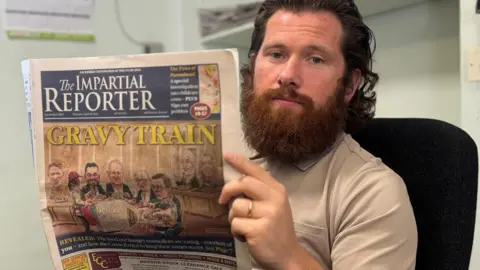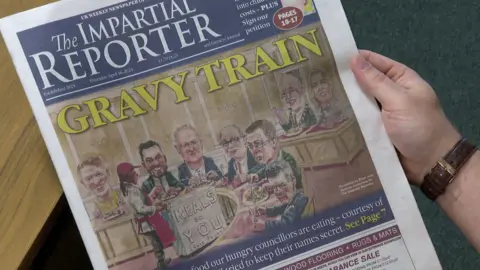 BBC
BBCThe amount of council business being done behind closed doors is damaging public trust in politics, a Green Party representative has said.
Concerns have been raised over public transparency in Northern Ireland’s councils as figures suggest a fifth of business is conducted behind closed doors.
Áine Groogan, a Green Party councillor in Belfast, said the amount of council business being held in private did “real damage” to transparency and trust in politics.
About one-in-five agenda items in Northern Ireland in the past year were tabled for debate in private, according to BBC News NI analysis.
‘Clear approach’ needed
“There are also considerable inconsistencies between councils around how the rules are applied and how or even if the restrictions can be lifted,” Áine Groogan said.
“We need a clear and consistent approach to restricted items in order to restore faith in our institutions and build trust between elected representatives and the people we represent.”
One local newspaper said it faced complaints from a council after revealing it had voted in a confidential meeting to give councillors more free meals.
Councils say they follow local government legislation to decide which issues should be restricted, such as staffing, financial and legal matters.

Northern Ireland has 11 councils which have responsibilities ranging from leisure facilities to bin collections.
BBC News NI examined the minutes and agendas of full council meetings from June 2023 to May 2024 and tallied the number of items listed for discussion in closed session.
This means councillors debate and make decisions in private, with the press and public excluded from those parts of the meeting.
Mid Ulster District Council had the most items listed to be held confidentially at about 35%, followed by Fermanagh and Omagh District Council (26%) and Antrim and Newtownabbey Borough Council (25%).
In one meeting in the Causeway Coast and Glens Borough Council in October, two-thirds of the agenda business was in closed session.
Mid and East Antrim Borough Council also had two meetings in which half of the agenda was held in private.
‘People should know how their money is spent’
In April, the Impartial Reporter newspaper revealed Fermanagh and Omagh District Council had decided in a closed session to increase its provision of meals for councillors.
A reporter and photographer later tried to question councillors about the issue as they arrived for a meeting.
In response to the coverage, the council complained to the Independent Press Standards Organisation (Ipso).
The council cited grounds including “harassment” – an Ipso clause devised following concerns over paparazzi after the 1997 death of Princess Diana.

A Sinn Féin councillor also accused the newspaper “fat-shaming” over an image which depicted him as the children’s book character The Very Hungry Caterpillar.
Ipso said the complaints against the newspaper had since been dismissed.
Impartial Reporter editor Rodney Edwards said it was an “affront to press freedom”.
“The people of Fermanagh and Omagh have a right to know how their money is being spent and to demand transparency from their elected officials,” he said.
Ciarán Flaherty, the paper’s news editor, said he was surprised by the council’s response to the coverage.
“It was probably a bit over the top, trying to silence us on something that probably didn’t need to come to this conclusion,” he said.
Councils defend decisions
Fermanagh and Omagh District Council said it was “open, transparent and fully accountable” and operated in “full compliance” with local government legislation.
It said all its council meetings were open to the public, live-streamed and papers were published in advance online.
A spokeswoman defended the council making decisions in private on food for councillors, saying it “met the legislative requirements” to be held in closed session.
The council said it welcomed recent Ipso decisions and claimed there were “inaccuracies” in some of the newspaper’s reporting.
“Fermanagh and Omagh District Council is committed to ensuring that all our work is carried out professionally and in compliance with all relevant legislation,” the spokeswoman said.

Sheamus Greene, the Sinn Féin councillor who complained to Ipso, said his concern “wasn’t with the story but in the manner in which it was being reported”.
He said “no rules were broken” and argued the council’s food offering helped save the public purse money on councillor expenses.
“Ipso said that the newspaper broke no rules either, which clears the matter up for me,” he said.
Mid Ulster District Council said it followed the Local Government (NI) Act 2014 when deciding which discussions should be held in private.
“Typically such information would relate to staffing, financial and legal matters of the council, or of third parties,” a spokeswoman said.
“All other items are taken within open sections of our meetings.”
Causeway Coast and Glens Borough Council said it sought “to maximise the conduct of its business in public”.
A spokeswoman added: “However, debate does on occasion move ‘behind closed doors’ in line with standing orders when confidential information could be disclosed in breach of an obligation of confidence.”


